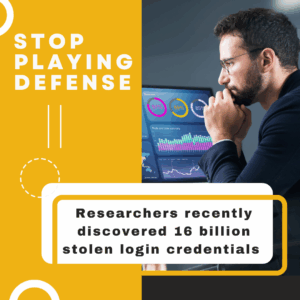 If you’re not a Comcast customer, you may not have heard, but recently, a list of more than half a million Comcast user logins and passwords was found for sale on the Dark Net. Fortunately, a significant portion of those user id’s and passwords were for defunct accounts, but more than 200,000 of them were still active, which prompted Comcast to force a password reset on every account that appeared on the list. Even though the majority of the list from Comcast contained inactive accounts, 200,000 hacked accounts is a lot.
If you’re not a Comcast customer, you may not have heard, but recently, a list of more than half a million Comcast user logins and passwords was found for sale on the Dark Net. Fortunately, a significant portion of those user id’s and passwords were for defunct accounts, but more than 200,000 of them were still active, which prompted Comcast to force a password reset on every account that appeared on the list. Even though the majority of the list from Comcast contained inactive accounts, 200,000 hacked accounts is a lot.
We all know that passwords are a necessary evil, but too often, too many of us make it easy for hackers to get a Master Key to our lives. How? A significant portion of internet users use the same password for every website they visit. If a hacker obtains the password from one site, they can simply try that password on other sites as well, and quite often it really is that easy.
Unique Passwords
If you’re still using the same password for every site you visit, this is your wake-up call. Now is the time to start changing your passwords up. Each website that you create an account on should have a unique password. While this could make keeping up with your passwords a little more complicated, it’s better to have this extra security in place.
Password Management
Another thing you can do to help yourself is to use a password vault like LastPass or a similar service. It’s not a bullet-proof solution, of course, as the hacking community recently demonstrated by hacking into LastPass’ supposedly unassailable system. However, password managers still provide an added layer of protection that will keep you safe from all but the most determined hacks.
Multifactor Authentication
An increasing number of sites are offering multi-factor login. This means that it takes more than one form of identification to login. This process usually involves a special USB key, or an authentication app that runs on your cell phone, like Google Authenticator.
Keeping our data secure is more important now than ever, because we keep so much of our lives online. While technology continues to change, new security options will become available, and hackers will continue to adapt as well. As these changes occur, we as users are also responsible for keeping up with the security of our private information.



